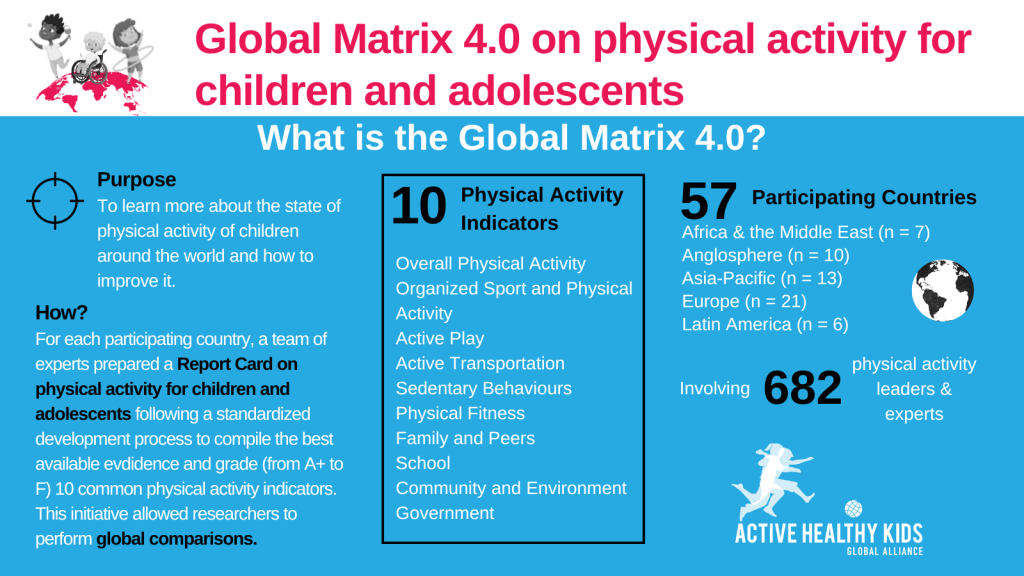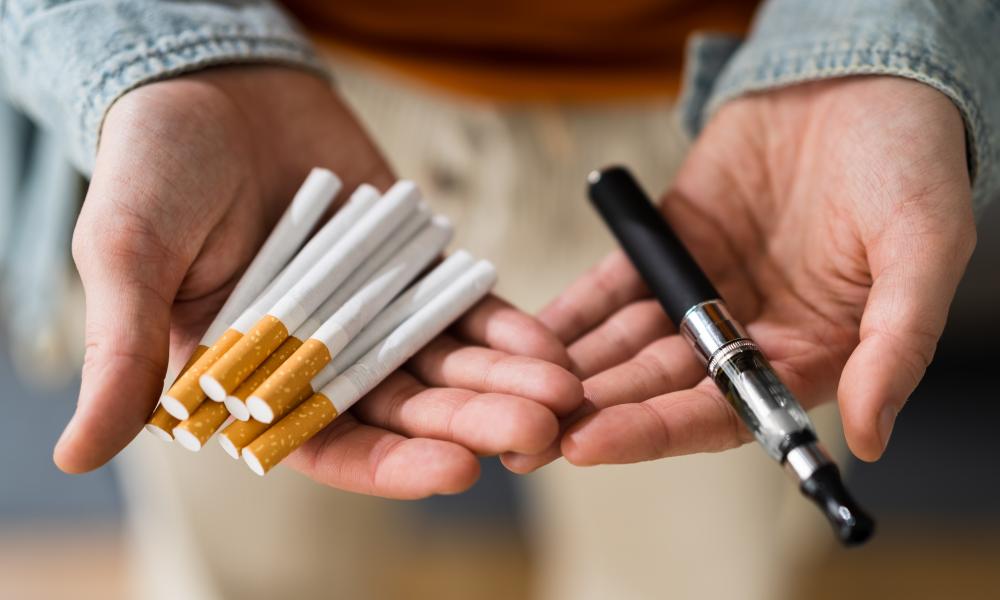
In this blog, Lauren Rodriguez, IPH Public Health Development Officer, shares an overview of the 2022 Ireland North and South Report Card on Physical Activity and also looks at how the findings compare with Scotland and Wales.
In August 2022, the Ireland North and South Report Card on Physical Activity for Children and Adolescents was produced as part of the Active Healthy Kids Global Alliance. The report was developed by a team including academic researchers from universities in Ireland and Northern Ireland[1].
Since 2014, close to 70 countries have taken part in the global study using a standardised grading system, with grades from “A” for succeeding with a large majority of children to “F” for succeeding with few children and adolescents.

The 2022 Report Card is the third report of its kind for Ireland and Northern Ireland and provides a grade across eleven indicators for physical activity among children and teenagers. What is new for 2022 is the inclusion of physical activity indicators relating to children living with disabilities.
How Ireland, Northern Ireland, Scotland and Wales compare
While there is little standardised data on physical activity across the UK four nations and Ireland, the Active Healthy Kids Global Alliance provides an opportunity to compare progress.
The participation of Wales, Scotland and England in the initiative provides potential for comparison, although the England report card is not yet available. The Welsh and Scottish report cards were published in 2021 and found similar patterns of inequality as summarised in Table 1.
Ireland and Northern Ireland
The 2022 Ireland North and South report card found:
- An improvement in overall physical activity levels across the island of Ireland since 2016, which increased from a D to C- in 2022.
- There were changes in four grades from the 2016 report card, these included: Organised Sport which decreased in Northern Ireland from C+ to a C and increased in Ireland from C- to a C; Active Transportation decreased from a D to a D-; School increased from a D to a C-; Physical Education increased from a D- to a D.
For the first time in 2022 grades for children living with disabilities were awarded and found that:
- The majority of children with disabilities on the Island of Ireland did not achieve the recommendation of at least 60 minutes of moderate to vigorous physical activity (MVPA) every day. When data specific to disability were compared to the overall report card grades, disability grades were lower for each indicator with the exception of Family and Peers, where the grade was higher.
The report card identified inequalities along gender, age, and socioeconomic lines. Boys were more likely to meet the physical activity guidelines than girls, younger children were more likely to meet the guidelines than older ones and children from lower socioeconomic backgrounds continue to be left behind.
Watch this three-minute video summarising findings from the 2022 Ireland North and South report card.
Wales
The Active Healthy Kids Wales Report Card found that:
- The majority of children in Wales did not achieve the recommendation of at least 60 minutes of MVPA every day and spent excess time (>2 hours) in sedentary behaviour.
- All but three grades remained the same or decreased from the 2018 report card, these included: Active Play increased from C− to C+; Active Transportation, D+ to C−; Family and Peers, D to D+.
- The Welsh report card found that inequalities in children and young people were congruent with previous report cards in 2016 and 2018.
The authors of the report card cautioned that these negative trends together with recent research emerging from the COVID-19 pandemic may further compound the findings, although more research is needed to understand the full impact.
The authors reported that socioeconomic inequalities have widened since previous report cards in relation to organised sport and physical activity and risk further widening in the wake of the Covid-19 pandemic.
Table 1: Summary of Ireland / Northern Ireland, Wales and Scotland Report Cards on Physical Activity for Children and Adolescents (2021/ 2022)
| Indicator | Ireland: North & South (2022) | Wales (2021) | Scotland (2021) |
| Overall Physical Activity | C- | F | Inconclusive |
| Organised Sport and PA | C- (Ireland) C (Northern Ireland) | C | B- |
| Active Play | Inconclusive | C+ | Inconclusive |
| Active Transportation | D | C- | C- |
| Sedentary Behaviours | C- | F | F |
| Physical Fitness | Inconclusive | C- | Inconclusive |
| Family and Peer Influence | D+ | D+ | D- |
| School | C- | B- | |
| Community and the Built Environment | B+ | C | B- |
| National Government and Policy | B | C | C (Physical Activity) C- (Diet) |
| Physical Literacy * | C- | ||
| Diet | Inconclusive | ||
| Obesity | Inconclusive |
*Physical literacy variable was only analysed in Wales
*Diet & Obesity variables were only analysed in Scotland
Scotland
The 2021 Active Healthy Kids Scotland Report Card found that:
- The majority of children did not meet the recommendations of no more than 2 hours screen time in sedentary behaviour
- The overall physical activity grade was inconclusive due to data gaps
- Sedentary Behaviour worsened from D- to F; Organised Sport from B to B-; Active Transportation from C to C; Family and Peers from D to D-.
The Scottish report card highlighted the socioeconomic dimension of inequality, with high rates of sedentary behaviours (exceeding 2hrs TV time per day) and fewer children engaging in sport when they came from socially deprived backgrounds.
Observations
Learning through comparison
Differences in data systems and definitions prevent us from reaching firm conclusions on the ‘performance’ of Ireland, Northern Ireland, Wales and Scotland in terms of children’s physical activity. However, participation of all four UK nations and Ireland in this global initiative could be further leveraged to build opportunities for partnership and joint research.
Different nations, shared challenges
Notwithstanding small differences in grades between Ireland, Northern Ireland, Wales and Scotland, low levels of physical activity among children and young people remain a significant challenge and progress has been slow, at best, and, non-existent, at worst. Inequalities are the common imprint across all report cards. Despite some investment in programmes, girls, children living in social disadvantage and children with disabilities are finding themselves excluded from the benefits of physical activity.
Ireland and Northern Ireland top of the class?
Ireland and Northern Ireland scored better on general physical activity and seemed to report lower levels of sedentary time than Wales and Scotland. On the surface, this might provide opportunity to gloat. In reality, however, there is no room for complacency and the validity of this finding and the factors underpinning this difference should now form a distinct line of investigation through further comparative data analysis.
Wales setting the standard on data
Wales is the only region to report on all indicators. A goal for future report cards for Ireland and Northern Ireland should be to meet the Welsh standard in this regard. This will require a review of data availability and the introduction of additional survey questions or instruments to report on all indicators in the future.
Poor performance on active transport on the island of Ireland
In general Scotland and Wales scored highest on active transport, suggesting the need for catch-up investment in children’s active transport on the island of Ireland.
Welsh schools and Scottish sport
Higher grades were also evident in terms of schools in Wales and in terms of organised sport in Scotland. Differences in data or how physical activity is positioned in the Welsh school curriculum or how sports participation is promoted in Scotland will provide food for thought and should require further consideration.
Pandemic effects
Like the Ireland and Northern Ireland Report Card the Scottish and Welsh report cards excluded data obtained during COVID-19. The authors noted that the impacts of lockdown will need to be further analysed in subsequent report cards. Further research is needed especially in relation to the disaggregation of data so that we can better understand how social determinants, including disability, age, gender, and socioeconomic status, impact on physical activity.
The Ireland and Northern Ireland report card made a series of policy recommendations, including the following:
- Continue to develop policy measures that address inequalities highlighted in the report across a range of determinants, including disability, gender, socioeconomic status, and age.
- Continue to progress the development of a framework for the systematic surveillance of indicators related to physical activity for children and adolescents with disabilities. These include greater representation, and consistency of measurement tools in policy.
- Prioritise research specifically designed to measure levels of activity in children and adolescents with disabilities.
- Address persistent gaps in data availability in relation to a number of indicators, for example, ‘Active Play’ and for some sub-groups of children and adolescents, for example, data in younger children. Increase the use of objective measures across the indicators to help overcome a reliance on self-reported data in relation to physical activity.
- Action the grade on the Government indicator (B+), which was assigned a grade for the first time, to provide further rationale and support for the implementation of the National Physical Activity Plan in Ireland and “Active Living” Sport and Physical Activity Strategy for Northern Ireland.
- Future report cards will need to consider the impact of COVID-19 public health measures on physical activity as data from March 2020 were not included in the grading of this Report Card. The impact of the COVID-19 pandemic on indicators will need to feature in subsequent Report Cards, when more robust data is available.
Active Healthy Kids – Ireland North and South Team of Investigators
[1] Angela Carlin, PhD Ulster University, Northern Ireland
Marie Murphy, PhD Ulster University, Northern Ireland
Dr. Helen McAvoy Institute of Public Health, Ireland
Sarahjane Belton, PhD Dublin City University, Ireland
Tara Coppinger, PhD Cork Institute of Technology, Ireland
Conor Cunningham, PhD Institute of Public Health, Ireland Ulster University, Northern Ireland
Alan Donnelly, PhD University of Limerick, Limerick, Ireland
Kieran Dowd, PhD Technical University of Shannon, Ireland
Deirdre M. Harrington, PhD University of Strathclyde, Scotland
Elaine Murtagh, PhD University of Limerick, Ireland
Kwok Ng, PhD University of Limerick, Limerick, Ireland University of Eastern Finland, Finland
Wesley O’Brien, PhD University College Cork, Ireland
Tamsyn Redpath, PhD Ulster University, N. Ireland
Catherine Woods, PhD University of Limerick, Ireland
Sinead Connolly Ulster University, Northern Ireland
Lauren Rodriguez Institute of Public Health, Ireland


